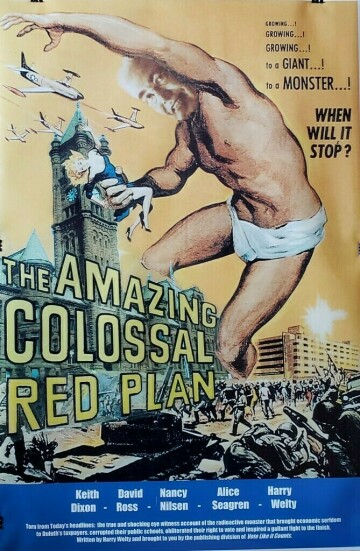The Amazing Colossal Defender of Democracy
It’s OK to vote for him for the School Board

I have a checkered history of promising to write books. You see one such example above.
After tinkering with a poster for a 1950’s B movie I advertised my intention to write a book about the recent Red Plan bulldozer that deprived Duluth voters of their right to vote on a half billion dollar plan to rebuild most of the city’s public schools. In the process the District chased about 1,500 students out of the Duluth Schools. It was an epic battle that consumed four years of my life.
The fiasco was eminently worthy of the book I advertised. I collected sales from a 100 buyers before deciding its complexity exceeded my energy. I refunded all the sales.
I found the energy again on Jan. 6, 2021 when Donald Trump sent “patriots” to lynch Congress after he’d spent a year plotting to steal the 2020 election because polls predicted he would lose. If anything is sacred in a Democracy it’s a fair election.
America’s elections only began being fair in 1965 when the Voting RightsAct stopped Dixiecrats (now called Republicans) from preventing black Americans from voting. In recent years a “Republican” Supreme Court has used southern ideas like “originalism” and “state’s rights” to give Republicans the power to tamper with fair elections.
The starting gun for this sea-change began in 2000 when the Supreme Court found an exception to staying out of the state of Florida’s business insuring that George W. Bush, the likely loser of the Florida presidential election, would be declared the winner. This was after Bush’s win in the South Carolina Primary where his Dark Money supporters robo called every Republican voter to tell them that his opponent, John McCain, fathered a black child.
That’s another monstrosity the Republican Supreme Court has supercharged in Citizens United v. the Federal Election Commission. It allows the super rich to pour vast sums of money secretly into the campaign pockets of favored candidates under yet another innovative legal doctrine that says money is “free speech” protected by the First Amendment. Evidently the rich have a lot more of it.
Throw in Donald Trump’s discovery that a loser need not concede defeat, now being copied around the world by would-be dictators, and you have the makings for Democracy’s fall across the entire world.
Growing up I watched my Dad follow every nominating convention and stay up late for every election night’s result. It impressed on me the importance of the elections America inspired all across the world. Here’s a short anecdote that illustrates how deeply honest elections have become part of my DNA.
As a sophomore at Mankato State I ran for reelection in the annual Student Senate race. Typically athletes and Greeks won the elections easily because only 1 in 10 students bothered to vote. The Fall election of 1970 became controversial when it was learned that Athletic Coaches had given lists of preferred candidates to their teams to vote for. Non voting students didn’t know what the coaches knew.
The Student Senate exercised some serious influence on the spending of the Student Activity fees paid by 15,000 students every quarter. The athletic teams got a piece of it. They wanted friends to help their cash-flow and I was a member of a fraternity they were collecting votes for.
One of my fraternity brothers was on the Wrestling team. He told me about the list he was given. I was outraged. How dare the teachers tamper with student votes! Thinking about it now I don’t see anything illegal about this. but it sure didn’t smell right. I was probably more incensed than the independents who got outvoted. So I hustled over to confront the celebrated coach, Rummy Macias.
I’d been to a couple wrestling meets and got a big kick out of Mrs. Macias who screamed support at every wrestler on Rummy’s team until she was hoarse.
I demanded to know if it was true that Rummy had stuck his nose in the student’s election. He was a tiny man and must have wrestled in the 100 pound weight class. He looked up at me bewildered that I, one of his beneficiaries, was raising hell. It probably didn’t occur to me then that Rummy might have noticed that my last name was the same as the president of the Faculty union. He stammered a bit and that was enough for me so I left. I’d made my point.
Then I supported the outcome of the election because the lucky winners hadn’t done anything wrong and it would have been a hassle to re-vote. Its nice when pragmatism helps your side out. It strikes me that this kind of reasoning may be even more persuasive to the Republican Supreme Court than its Dixiecrat judicial doctrines.
The next year, 1972, a constitutional amendment went into effect allowing 18-year-olds to vote for the first time. The Nixon-supporting Republicans were worried sick that students would cast anti-Vietnam votes against them everywhere. By 1972 I’d become a Republican and I dipped into my pocket to use my free speech rights to convince students to vote for a Republican State Senator. He hadn’t bothered to campaign on the campus with its 12,000 new voters.
My flyer got him elected. The banker he defeated was not happy. The loser’s college supporters told me their man gave some thought to suing me. I was not impressed. And what of the section subtitle about its being OK to vote for me for the School Board? That was the word from a fellow Republican to her friends. It was OK to vote for me because my being on the school board, unlike the Legislature, meant I couldn’t vote for Pro-choice laws even if I was a baby killer.
This is a passage from the book I’m about to publish which might accompany a campaign for Congress. Its mentioned at lincolndemocrat.com
